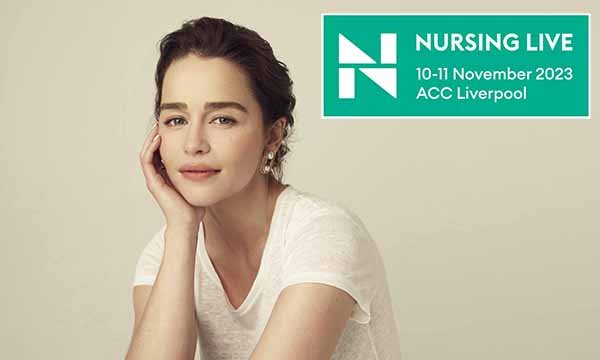Nurses were key to my daughter Emilia Clarke’s trauma recovery

Brain injury charity set up by the actor and her mother funds a postgraduate nurse education programme and campaigns to improve rehabilitation globally. Hear Jenny Clarke speak at Nursing Live

In 2011, my daughter, the actor Emilia Clarke, survived the first of two life-threatening brain haemorrhages while working on the Game of Thrones television series.
It was during this devastating time, with Emilia undergoing emergency surgery, that as a family we saw first-hand the precious and irreplaceable role of the nurse that helped Emilia to make a full recovery.
Nurses are essential to rehabilitation yet are rare in the multidisciplinary team
When Emilia and I were discussing launching our charity, SameYou for brain injury recovery, she confirmed that the single most important part of her own experience in acute care – and on her discharge from The National Hospital for Neurology and Neurosurgery – was the nurse who cared for her.
She held my daughter’s hand to take away her anxiety, explained the complex processes and managed her day-to-day care.
And this led to SameYou’s founding principle: we believe nurses are the key to the future of successful rehabilitation.
Our own research in the US and the UK has shown that nurses are not enabled to play as big a part as they could in helping patients and their families come to terms with their new lives after surviving trauma.
We found it hard to understand why most of the multidisciplinary teams we met and worked with didn’t include nurses. We know from our own experience and that of patients around the world the true value of care to aid recovery after trauma, and how damaging it is for patients if that support is missing.
When we launched SameYou in 2019 and Emilia told her story to The New Yorker, the sheer numbers of survivors reaching out to us crashed our website.
Shockingly, their stories, around 10,000 of them so far, have revealed a huge unmet need for rehabilitation, leading to significant mental health issues and a struggle to ‘live well’.
So that was where SameYou began.
Postgraduate certificate for advanced-level nurse practitioners

That important outpouring from survivors led us to one of the biggest innovations we have funded – a partnership with the RCN Foundation and Nursing Studies at the University of Edinburgh.
Under the leadership of the remarkable Professor Aisha Holloway, the University of Edinburgh developed a postgraduate certificate programme consisting of three modules for registered nurses with clinical experience and interest in neurological care. The course runs online to give greater flexibility. Here is a short video about this programme.
This focuses on a holistic approach to rehab care including mental and physical recovery and research, allowing nurses to up-skill and have a deeper understanding of a specialist area. We are in the second year and are proud to be associated with it.
A staff nurse who has recently completed the training says she wanted to use it as a platform to create awareness and a greater understanding of rehabilitation.
‘Evaluation of the economic benefits of advance practice nurse training revealed it can leading to better health outcomes, patient satisfaction and economic savings’
She says it is an important course when you consider the statistics. Every 90 seconds someone will attend hospital with a brain injury. And as it can knock patients and their family’s lives off course, the ability to offer support can have a huge impact on their quality of life.
She says to have that professional knowledge can significantly help the survivor’s ability to regain independence.
This work moved us forward for a collaboration with the RCN Foundation and The London School of Economics and Political Science to evaluate the economic benefits of investing in advance practice nurse training. The outcomes were eye-opening, revealing that the investment can be beneficial, leading to better health outcomes, patient satisfaction and economic savings.
Unfortunately, the lack of recovery care is an issue that affects every corner of the earth. Our focus on rehabilitation paved the way to us working with Nursing Now for its Global Solutions Initiative, to connect with early-career nurses around the world to share ideas for innovation and make a difference in the recovery pathway. This included mentoring nurses in Ghana and evaluating how technology can play a role in rural communities.
In July, our work led us to Geneva as SameYou was granted membership to the World Health Organization’s new World Rehabilitation Alliance after it committed to boosting worldwide access to rehabilitation. Watch this space.

Hear more from the author at Nursing Live
SameYou chief executive Jenny Clarke will be at Nursing Live to talk about the role of the patient voice in healthcare.
Nursing Live is a unique event for nurses, brought to you by RCNi
Free event: Sign up here for Nursing LiveNurses can play a transformative role in rehabilitation
It is clear it will need a joined-up approach to help the millions of patients around the world, to listen to them, to help them access what they need to enable them to live well. And that’s why nursing is key to the future of successful recovery after trauma.
With your experience and empathy with your patients and their families, it will really help to pinpoint the needs and further amplify the patient’s voice in defining the new world of rehabilitation.

